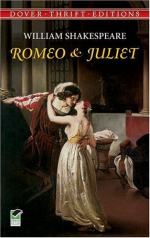|
|
Romeo and Juliet Topic Tracking: Fate
Fate 1: The Prologue points out that Romeo and Juliet have fate against them. It says that their love is "death-marked," and they have no control over what happens. It is their misfortune that leads to the sorrowful and tragic ending of the play.
Fate 2: Peter runs into Romeo and Benvolio on the street. It is this encounter that enables Romeo to read the list of names of guests for the Capulet feast. Had Romeo not run into Peter, he would have never gone to the feast, and hence, never even met Juliet. It is fate that makes this encounter possible.
Fate 3: Before Romeo enters the house of the Capulets, he speaks about an unknown danger "hanging in the stars." This notion of events expected to occur being written in the stars explains how life is predetermined by fate. Romeo senses that something bad may occur, based on his fate.
Fate 4: Here, the friar warns Romeo that people who act impulsively often have very negative and destructive consequences. This warning reminds the audience that Romeo's fate is already predetermined, and that there will, in fact, be negative consequences to his actions.
Fate 5: Mercutio yells out in anger. These words are a reminder to the tragedy that is fated to occur. Romeo and Juliet have very little to do with what happens to them at the end of the play. It is sheer misfortune and fate that lead to the tragic ending.
Fate 6: Romeo himself realizes that fate has much to do with the events that have taken place. He knows that something else is fated to occur, something that will end the feud between the Capulets and the Montagues.
Fate 7: Juliet tells Romeo of her vision of him dead at the bottom of a tomb. This is foreshadowing to the already destined event these two lovers will soon face - death.
Fate 8: Romeo has a dream that Juliet finds him dead. This is foreshadowing to the already destined event these two lovers will soon face - death. This is yet another example where fate has a role in the lives of Romeo and Juliet; it is something that they cannot control.
Fate 9: Romeo learns that Juliet is dead. He says that he defies fate, by saying that he defies what is written in the stars. He refuses to accept that Juliet is dead. What Romeo does not realize is that he has no control over his destiny. No matter how angry or motivated he is to change what is written in the stars, he cannot. It is already predetermined.
Fate 10: Friar John explains to Friar Laurence that he never made it to Mantua to give the letter to Romeo. Because Romeo never receives this letter, he buys poison with the intention to kill himself upon seeing her dead in her tomb. It is fate that did not allow the friar to reach Romeo in Mantua. And thus, it is also fate that Romeo buys the poison and eventually kills himself by Juliet's side.
Fate 11: Juliet wakes up from the sleeping potion and asks the friar where Romeo is. The friar responds by saying that some higher power has changed their original plans. This higher power is what people have no control over - fate. Through fate, the friar does not make it to Juliet's tomb on time. Romeo kills himself before the friar can tell him that Juliet is not really dead. This is not the friar's fault. Rather, it is fate that he did not get there on time.




